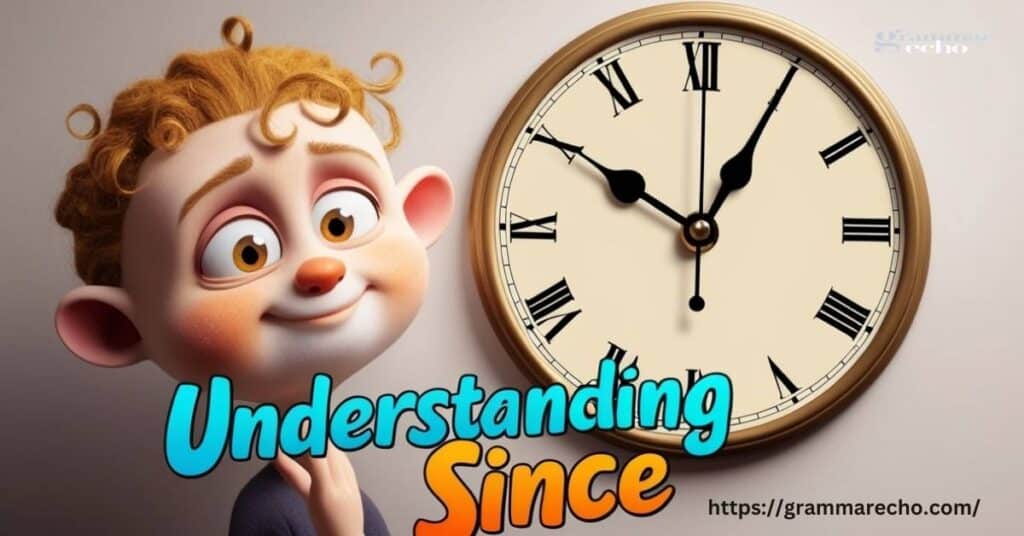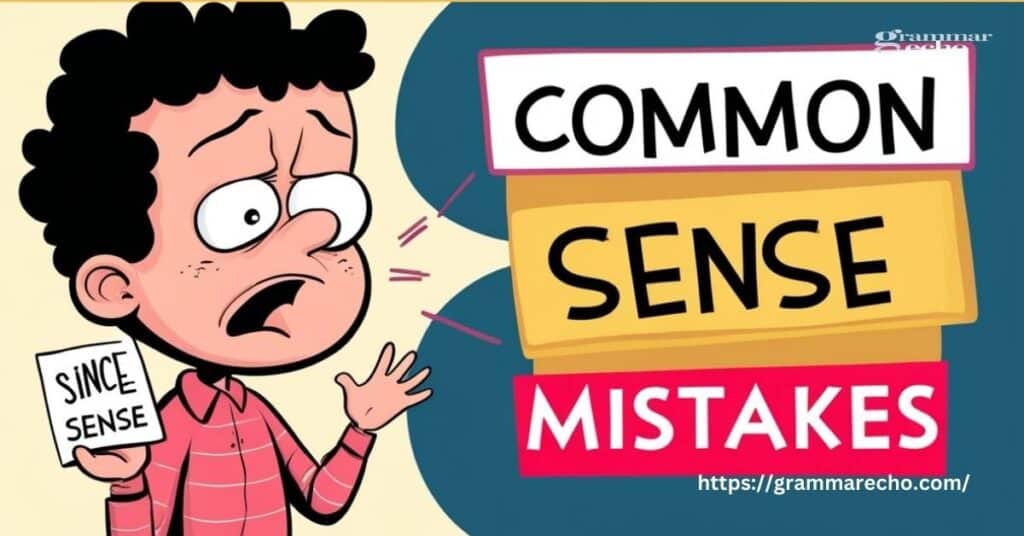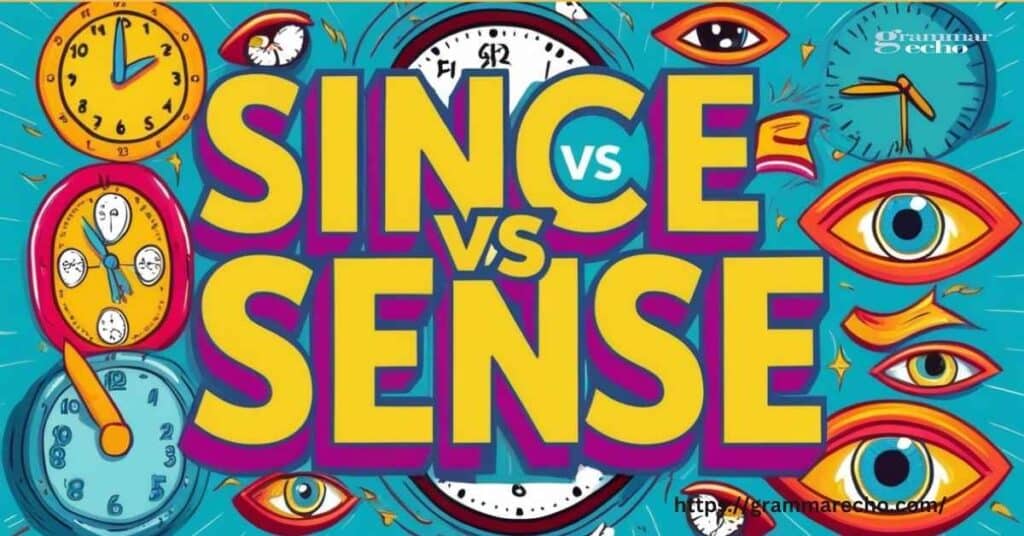In this article, we’ll break down the meanings, grammatical roles, and practical applications of “since” and “sense.” By providing clear examples and helpful writing tips, you’ll learn how to use these words accurately in various contexts.
Whether you’re crafting essays, emails, or creative pieces, knowing the since vs sense difference will give your writing more precision and depth. Let’s dive in!
Defining “Since” and “Sense”
To grasp the since vs sense distinction, let’s start by defining each word in detail.
Since

“Since” can function as a conjunction, preposition, or adverb. Each usage serves a different purpose:
- As a conjunction: It connects two clauses, often indicating time or reason.
- As a preposition: It refers to a starting point in time.
- As an adverb: It shows the passage of time from a specific point until now.
Usage Examples
- Since as a Conjunction:
- “I will go to the party since I finished my homework.”
- Here, it connects the reason for attending the party.
- Since as a Preposition:
- “We have been friends since 2010.”
- This indicates a starting point in time.
- Since as an Adverb:
- “I haven’t seen her since last year.”
- This shows the passage of time.
Sense

On the other hand, “sense” primarily serves as a noun or a verb:
- As a noun: It refers to perception, feeling, or meaning.
- As a verb: It indicates the act of perceiving or understanding.
Usage Examples
- Sense as a Noun:
- “He has a good sense of humor.”
- This conveys a quality of perception.
- Sense as a Verb:
- “I can sense that something is wrong.”
- Here, it reflects the act of feeling or understanding.
You will like: What is the Plural of Chief? Chiefs or Chieves?
Since vs Sense: Understanding Their Roles
Knowing the definitions is just the beginning. Let’s delve into how these words function in sentences and how they relate to each other.
Since as a Time Traveler (or Reason Giver)

When using “since,” think of it as a time traveler or a reason giver. It helps establish when something happened or why it happened.
Scenario Example
Imagine a conversation between two friends:
- Friend A: “Why didn’t you call me last week?”
- Friend B: “I didn’t call you since I was really busy with work.”
In this scenario, “since” provides a reason for the action.
Sense as Your Internal Compass

Conversely, “sense” acts as your internal compass, guiding your understanding of feelings and perceptions.
Scenario Example
Consider this interaction:
- Person A: “How did you know she was upset?”
- Person B: “I could just sense it from her tone.”
Here, “sense” indicates an emotional understanding that goes beyond words.
Putting It into Practice: Makes Sense or Since?
A common point of confusion arises when deciding whether to use “since” or “sense” in sentences. Let’s clarify this with practical examples.
Since Examples
- “I have been waiting for you since noon.”
- “She decided to leave early since she wasn’t feeling well.”
Sense Examples
- “I can sense the excitement in the room.”
- “He lacks a sense of direction.”
You will like: Vicious vs Viscous: Use Them Correctly in Writing
Words You Can Use in Place of “Since” and “Sense”
Sometimes, using synonyms can help clarify your message. Here are alternatives for both words:
Since
- When indicating time:
- “From,” “After,” “As of”
- When indicating reason:
- “Because,” “As,” “Due to”
Sense
- When referring to perception or feeling:
- “Feeling,” “Awareness,” “Intuition”
- When referring to meaning or understanding:
- “Meaning,” “Significance,” “Interpretation”
Origins of “Since” and “Sense”
Understanding the origins of these words can provide insight into their meanings.
Since
The word “since” originates from the Old English “sinn,” meaning “from that time.” This historical context emphasizes its role in marking time and reason.
Sense
“Sense” comes from the Latin “sensus,” meaning “feeling” or “perception.” This etymology highlights its connection to emotional and sensory understanding.
Common Mistakes: Avoiding Confusion

Even seasoned writers can stumble over “since” and “sense.” Here are some common mistakes to watch out for:
Mistake 1: Using Since When You Mean Sense
- Incorrect: “I can’t believe it doesn’t make since.”
- Correct: “I can’t believe it doesn’t make sense.”
Mistake 2: Confusing the Context of Since
- Incorrect: “I’ve known her since five years.”
- Correct: “I’ve known her since five years ago.”
Practical Tips for Mastering Since and Sense

To confidently use “since” and “sense,” keep these tips in mind:
- Context is Key: Always consider the context of your sentence. Are you discussing time, reason, perception, or feeling?
- Use Synonyms Wisely: Don’t hesitate to substitute with synonyms when appropriate, but ensure they fit the overall meaning.
- Read Aloud: Hearing your sentences can help identify if they flow naturally. If something feels off, revise it.
- Practice with Examples: Create your own sentences using both words to reinforce their meanings and uses.
- Seek Feedback: Share your writing with peers or mentors. Their fresh perspective can highlight areas for improvement.
Final Words
In conclusion, understanding “Since vs Sense” is vital for clear communication. These words serve different purposes, so using them correctly enhances your writing. With practice, you can confidently navigate their meanings.
FAQs
“Since” relates to time and reason, while “sense” pertains to perception and feeling.
Yes, “since” can act as a preposition to indicate a starting point in time.
Create sentences using both words and seek feedback to improve your understanding.

Lily Suzi is an experienced blogger and the voice behind Grammar Echo. With a passion for language and a knack for storytelling, she explores the nuances of grammar and writing in a relatable way. Her insights not only educate but also inspire readers to appreciate the beauty of clear communication.








